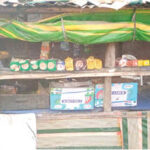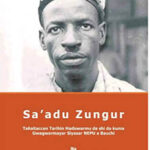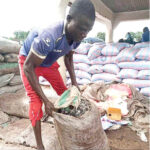Sometime in 1983, President Shehu Shagari launched his re-election campaign in Gboko, Benue State. He chose the town to honour one of the founders and pillars of NPN and a leading protest politician in the First Republic, the late Joseph S. Tarka. He was the leading politician, not only in Benue State, but in what was called the Middle Belt. It has since been renamed North-Central geo-political zone in our endless change of names as evidence of our national movement.
By co-founding the NPN, Tarka entered the mainstream of our national politics. He was no longer a protest politician, some of whom, by the way, found favour with the General Yakubu Gowon military administration. But death robbed him of the chance to put his mainstream politics to good use. Shagari remembered and honoured him. By launching his re-election bid in Tarka’s home town, he wanted to seek the blessing of his former political colleague and let him know that he still regarded him as the moving spirit in Benue State politics.
The launch must have been a huge success from the point of view of the NPN. Its information disseminators, for which read, propagandists, made sure the world appreciated the fact, if only to serve notice on the band of progressive governors buzzing in the ears of the ruling party like hungry mosquitoes, that the political space belonged to the NPN. The news media were told that three million people turned up at the launch in Gboko. The print and the electronic media spread the word. And the party went away with murdering the truth.
I cannot recall one newspaper that questioned the authenticity of the information put out by the NPN about the very impressive but unlikely campaign crowd in Gboko. We were not then in the habit of being sceptical about what we heard from official sources because they were considered too high up to indulge in the dirty tricks of lies, misinformation, disinformation and pure, unadulterated propaganda. And the media were largely government-owned. The times have changed. That change has crept into the newsrooms across the country. Our readers and listeners are more discerning now and, therefore, more sceptical in accepting what they hear on the electronic media and read in the print media as factual on their face value.
The NPN claim served its purpose. It told the other political parties that the juggernaut party was on the move and it would be foolish of the presidential candidates of their parties to stand in its way, unless they were suicidal enough to want to be crushed. The media aided and abetted the party in misleading the public because no questions were asked and so no answers were given to the basic facts that could have helped the media to inform the public better.
If, at the time, the news media had been sceptical and asked a few innocent questions, the entire carefully-constructed edifice of misleading information would have come crashing down, hopefully, on the head of the NPN. The media failed to ask, for instance, about the mind-boggling logistics of transporting three million people from every nook and cranny in the country to Gboko. Could the party have flown them to Makurdi, 80 km away? How many jumbo jets would the party need? If they were taken there by road, how many buses and lorries did it take to move three million people to Gboko? Imagine, for a moment, the chaos that would attend these movements.
Part of the reason for the media to so easily lap up incredible figures is that none of us can figure out what they mean in practical terms. Ever seen three million people? Perhaps not. Perhaps it would help to know that if you put the populations of The Gambia and Senegal together at the time, you might probably have a fair idea of three million people. Scepticism is a healthy habit and serious reporters and editors should wear it on their sleeves to constantly remind them that questions are important tools of the trade.
The habit of questioning authorities is an essential part of digging for and serving the public the truth; or, at least the facts. Scepticism is a good and healthy habit. A feeding frenzy is not much use in this enlightened age in which the news media as an institution is losing public respect for deviating from the path of integrity and professionalism.
The American news media have honed their healthy scepticism into an important branch of the modern news media. They operate on the principle that public officials cannot be totally trusted. Take what they tell you with a pinch of salt. The news media now employ researchers called fact checkers. Their duty is to cross-check claims by public and private officials on matters of public interest. Quite often, the facts they establish are at variance with the official “facts.” Fake news is official news manufactured by officials and sold to the news media. Now you know why it is so easy for the American media to catch their president at his favourite game – making false claims and outrightly lying to the American people. I am sure that our news media would bestir themselves sooner than later and catch up with their American counterparts. It is expensive but it is for a good cause – the cause of properly informing the people.
In the on-going war against Boko Haram, bandits and sundry others who choose to live on the fringes of the law, the armed forces have taken information sans information to a new and disturbing height. They have formed the habit of giving information without facts to support it. War with state and non-state actors rides on propaganda and the spin by both sides. Victory scores on either side is usually exaggerated and celebrated. But in no instance, so far as I know, has the Nigeria Air Force, which has, by its success record been killing bandits and Boko Haram in their hundreds ever provided the news media with photographic evidence of their success stories. Yet, each time Boko Haram ambushes and kills our soldiers we are given the photographic evidence by our own security forces. There is a hill of irony here you may wish to climb but not without a seat belt.
Our reporters and editors are still not asking the hard questions of our public officers and their counterparts in the private sector. Speaking from both sides of the mouth comes naturally to the public and the private sectors. In their failure to ask questions and exercise healthy scepticism, they let the camel walk through the eye of the needle. Time to stop it and make it harder for those who have the right to be heard to be more candid and as much as possible level with the news media. Information without facts does not qualify as news. It is only an opinion masquerading as news. The American actor, Denzel Washington, recently characterised this as opnews – opinion news – a clear contradiction in terms and a clash with the principles of journalism, to wit, facts are sacred; comment is free. If you conflate the two in opnews, you confuse the public.
Here is what happens when our reporters and editors lower their scepticism guard. In the Daily Trust issue of March 12 at page 11, we found this story: “Zamfara has 2m almajiris – Official.” The story was created to the state director of budget, Hamza Salisu. The intro to the story was: “Based on the data available to us, there are about two million almajiris across the state.”
Is it possible there are so many almajarai in that state? The 2006 national population census put the population of Zamfara State at 3,278,873. To think that two million of them are almajarai stretches credibility.
I vaguely recall that at the November 2017 education retreat organised by the federal ministry of education, President Buhari put the number of out of school children in the country at 13 million. He said that in addition, there were three million almajarai. Is it possible for Zamfara alone to own two-thirds of that figure? By the way, I wonder if the number of out of school children is a solid fact or an estimate? I know that experts have stuck to that figure for quite some time now but I do not think that makes it necessarily factually correct. The Daily Trust titles may wish to look further into the real number of out of school children and the number of almajarai in each of the northern states. I think a healthy scepticism should clear the fog that is making it difficult for us to see the facts clearly. Remember to wear your scepticism on your sleeve and your face mask on your face.
 Join Daily Trust WhatsApp Community For Quick Access To News and Happenings Around You.
Join Daily Trust WhatsApp Community For Quick Access To News and Happenings Around You.


